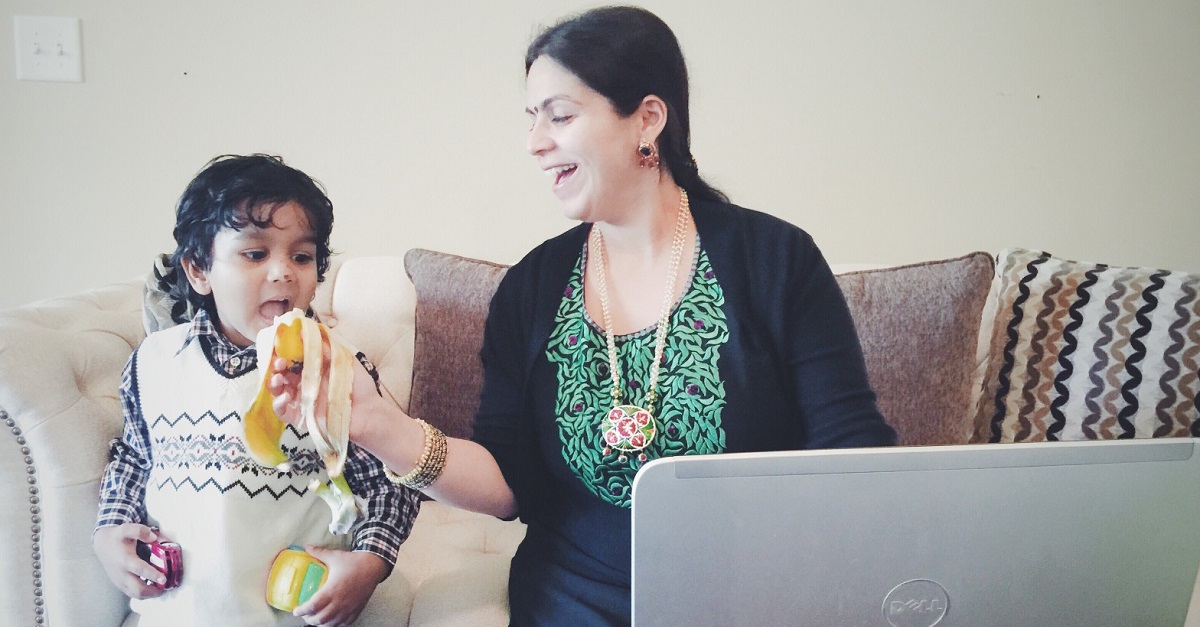
I never saw my mom struggle. She never said anything like, "I just need a minute to myself." And she was the type of working mom who took work home with her. As a first-grade teacher, there was always grading and lesson plans. Sometimes she let me help, which made it a bonding experience for the two of us.
If she were still teaching today, her classroom would be replaced by a computer. That, or she'd be living in pure fear of catching the virus and spreading it to her family. Teachers are under a lot of stress these days. But so are all working moms. It's just typically hard for us to admit, "I need help," especially when everything is so displaced.
On average, women handle a majority of the cleaning and child care when they're not at work. Having both parents home means that women need to figure out how to balance all three simultaneously. It's hard work. But it's become the new normal. And women everywhere are quietly wondering how to find the time in their day. The New York Times even feels as if this period of time may end up destroying working mothers.
"Women have carried an outsized share of the burden, more likely to lose a job and more likely to shoulder the load of closed schools and day care," the publication writes. "For many working mothers, the gradual reopening won't solve their problems, but compound them — forcing them out of the labor force or into part-time jobs while increasing their responsibilities at home."
If moms take off to try to supplement the child care they're losing, they're also putting their jobs — and any advancements they're working toward — at risk. "We could have an entire generation of women who are hurt," said Betsey Stevenson, a professor of economics and public policy at the University of Michigan, to The New York Times.
"They may spend a significant amount of time out of the work force, or their careers could just peter out in terms of promotions," she continued. Even briefly taking some time off work to handle child care can put women at a disadvantage. Having that gap might not be understandable to future employers.
The publication also states that in February, women made up half of our country's civilian nonfarm labor force. That means that more women are working than ever before. But even so, they're still taking on most of the child care efforts at home.
"Among married couples who work full time, women provide close to 70 percent of child care during standard working hours," the publication says. Many of them are feeling the added pressure due to the situation with schools and day cares closing. While some remain open, there's still a lingering risk.
That's yet another pressure working moms have. Even if schools do open, is it worth the risk to send your kids? If they get sick — or someone gets the teacher sick — there's a host of other problems that moms will have to handle. By keeping kids home for distance learning, women will have a hard time balancing both responsibilities. And rightfully so.
There's also the possibility that a child's schedule may be abnormal in order to keep everyone safe. Many school districts have discussed having kids go to school on a rotating schedule, to lessen the amount of bodies in the physical building. While a decent suggestion, that puts added pressure on working parents. But not a lot of women are talking about it.
These stats aren't even factoring in the emotional labor that many women take on. In 2017, Gemma Hartley wrote an incredible piece for Harper's Bazaar that illustrated her frustration when her husband couldn't take the time to put emotional work into a simple request she had for a Mother's Day housekeeper.
"Delegating work to other people, i.e. telling him to do something he should instinctively know to do, is exhausting," she said. "Walking that fine line to keep the peace and not upset your partner is something women are taught to accept as their duty from an early age." This, sadly, hasn't changed much. With all of the challenges of the world, women are more mentally overbooked than ever before.
"My husband is a good man, and a good feminist ally," Gemma explained. "I could tell, as I walked him through it, that he was trying to grasp what I was getting at. But he didn't. He said he'd try to do more cleaning around the house to help me out. He restated that all I ever needed to do was ask him for help, but therein lies the problem. I don't want to micromanage housework. I want a partner with equal initiative."
Maria Guido from Scary Mommy admitted that it's been an impossible burden to get it all done these days. She quoted a study published in Gender, Work & Organization that reported on how working has changed since the virus hit. The study found that "a working mom's schedule is being upended while dad's work schedule stays pretty much the same."
She offered suggestions on how to make change. For one, employers can consider shortening work hours, just to relieve some of the burden that their hardworking female staff members are handling. She also feels like fathers should be encouraged to take over some of the child care. Parenting should be as evenly split as possible.
A lot of the suggestions revolve around communication. But even trying to aim for healthier communication with your partner may be a hard goal to reach. Everyone is so stressed out and on survival mode. So a simple talk could lead to an unwanted argument.
And trying to get advice on what to do next is something many women don't want to do. Reason being, they don't want to feel like they're doing it wrong — or that they're alone in their situation. It's especially difficult for mothers, who face a lot of undeserved shaming. "Often, women don't talk about the mental load of being a mother, because we don't want to sound like we're feeding into the stereotype of the incompetent father who doesn't help around the house," Gemma writes.
Something needs to change. Women need to realize that while men may be programmed to not lend a hand, it's almost necessary if we want to keep both our jobs and our sanity. Working moms, know that your burden and stress are real. You do so much around the home that often goes unnoticed. And sadly, you risk being penalized for putting your family first.




